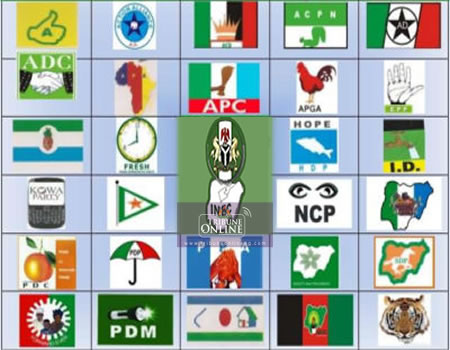
AS a major step in the build-up to the 2019 general election, political parties have been preoccupied with the process of nominating candidates for elective positions across the country. The parties are required by the timetable earlier issued by the Independent National Electoral Commission (INEC) to conduct primaries for all elective positions for the 2019 general election and resolve disputes emanating from the primaries by October 7. According to the law, they are free to conduct direct or indirect primaries or derive their candidates through consensus.
As stipulated in the INEC’s timetable and schedule of activities, the last day for the submission of the lists of sponsored candidates (Form CFOO2) and personal particulars (Form CF001) is October 18 for the presidential and National Assembly elections and November 2 for the governorship and state House of Assembly elections. Naturally, some parties have been in a frenzy. The situation is worsened by the protracted indecision arising from conflicts within some of the parties regarding the preferred method of determining their representatives.
Today, most of the parties have chosen their candidates for the vital public offices of president, governor and National Assembly member. However, the way party primaries have been conducted in the last couple of weeks has been very disturbing. In both the major and minor parties, there was overwhelming evidence that the basic processes of conducting primaries have neither been clarified nor are there established and respected rules for the internal processes of party primaries. There were claims that the venues for some of the primaries were not declared before the appointed date for the primaries in some parties.
In some cases, no list of voters was made public for contestants to view or verify. In other cases, there were no party membership lists. Again, there were disputes over the situation of things after winners had been announced, as some contestants maintained that no primaries were held. There were claims of widespread use of money to buy delegates’ votes, imposition of candidates, predetermined outcomes and thwarting of the democratic processes. Indeed, the primaries were riddled with violence, leading to the death or injury of citizens. Thus, judging by the level of rancour, hostility and disputes that attended the events in many states, the primaries were neither peaceful nor credible. Internal wrangling and defections preceded the process.
The primaries demonstrate that political parties have neither been institutionalized nor permeated by the democratic ethos. Politicians have been so desperate in their quest for public office that they have thrown caution to the wind. They have neither regard for rules nor commitment to a free and fair process within the political parties. They have shown that about two decades of working at electoral democracy has not led to the institutionalization of the internal processes of the parties. This is quite unfortunate. Political parties play vital roles in the electoral process. They are also very critical in defining public policy issues and deepening democracy. They cannot play these roles when they are so badly managed as demonstrated in the primaries.
It will be recalled that the INEC chairman, Professor Mahmood Yakubu, remarked sometime last year that most of the elections that were upturned by the courts after the 2015 general election were nullified due to the failure of political parties to conduct proper primaries or follow the outcome. If the political parties had ensured that their primaries were properly conducted in accordance with the provisions of the law, many of the re-run elections would not have been necessary. Re-run elections are usually conducted with huge financial outlay at the expense of the country. Thus, the cost of elections has been needlessly increased by the nullification of elections on the basis of badly conducted primaries.
Given the impunity that has attended most of the primaries, there is palpable fear that the mandate of Nigerians in the 2019 general election may be determined in the courts rather than at the polls. This is the case because those who are aggrieved are likely to go to court to challenge the outcomes of the party primaries on the basis of disregard for extant laws in their conduct. The courts are likely to cancel some of the primaries. Besides, some of the court cases may not be concluded before the general election because the recent amendment to Section 285 of the Constitution provides for the court of law to deliver its judgment in every pre-election matter within 180 days from the date of filing. Some of the pre-election matters may be decided after the conduct of the election.
The experience of the series of party primaries demonstrates that the behaviour of politicians remains a great threat to democratic deepening and stability. When politicians fail to observe basic democratic principles in their routine process of decision-making, how can they promote the democratic culture in the wider society? Politicians who are unable to uphold the rule of law and demonstrate democratic principles in the routine conduct of party primaries are bad managers of political parties. How can these politicians who have managed political parties so badly govern Nigeria well?
END

Be the first to comment